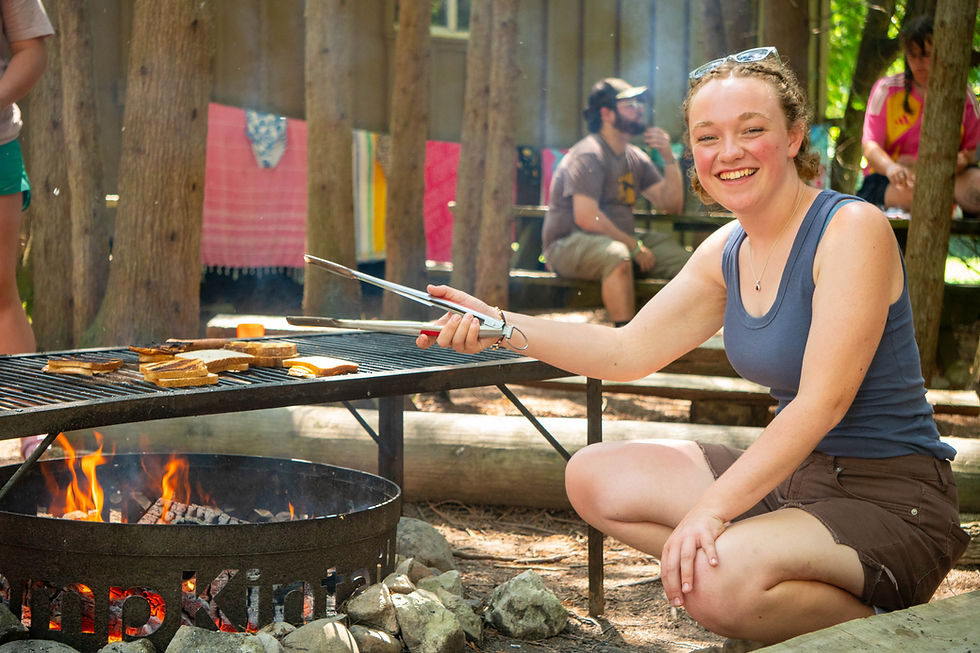Empathy Under Pressure:
- Camp Kintail

- May 27, 2025
- 3 min read
What Working With Kids Taught Me About Leading Adults
A typical business student dreams of landing a big bank internship, or a placement at a Toronto private equity firm, so you can imagine the amused looks I received when I proudly told my friends that I’d be doing my co-op placement at a summer camp. Not just any summer camp position, I got to be the Waterfront Director at Camp Kintail. This meant especially a lot to me, as I have so many formative memories of braving the chilly early-July lake temperatures in a 10-year-old attempt to show the Kintail lifeguards that I was super brave. Fast forward to 18, and I was a freshly minted Kintail lifeguard, with a shiny new Fox-40 Sharx whistle on my arm. Then, in April, I stepped back onto the sand, this time as Kintail’s Waterfront Director, alongside my incredible co-lead, Bluebell. After running a full six-month waterfront operation, I can confidently say that choosing Kintail as my management co-op was one of the best career decisions I’ve made; not just for the experience, but for what it taught me about leadership, communication, and empathy under pressure.
What most people don’t realize, is that camp is so much more than singalongs and sunscreen, especially down at the beach. At any given moment, I was responsible for monitoring anywhere from 50 to over 100 campers, leading the guard team as well as other staff, and ensuring the overall safety of every beach-goer. This involved a complex mix of split-second decision-making, de-escalating conflict, providing performance feedback, and maintaining high morale (sometimes without having my morning coffee). I’ve learned that effective leadership isn’t defined by being in charge; it’s about being calm, compassionate, and clear-headed in moments that feel like chaos.
In university, we are taught about leadership through models, case studies, and flow charts. Translating those polished theories into organic leadership can be tough, especially since the emotions and stakes aren’t weighing on you in your lecture chair. Working with children forces you to develop real communication skills. They don’t respond to buzzwords like “collaborative decision-making,” or “let’s delegate and circle back.” They respond to empathy, understanding, and a rational answer to “why not?” A Harvard business degree won’t teach you how to explain to a 7-year-old that they unfortunately failed the swim test.

In instances like this, or when telling a child that what they’re doing is unsafe, you can be met with frustration, confusion, and sometimes tears. Children take things literally and react honestly. This taught me the importance of communicating clearly, consistently, and concisely at all times. While adults are more subtle in their reactions, the emotional response underneath is often the same. Every person, regardless of age, deserves empathy, consistency, and patience no matter the situation. Working with kids has made this skill second nature.
Camp also taught me the necessity of regulating my emotions to ensure that everyone in my presence feels safe, which is vital in a high-stakes environment like waterfront safety, where decisions have real consequences. Learning to stay calm and rational in those situations means that I can now carry the same mindset into high-pressure adult spaces: from navigating employee conflict to making decisions that affect company finances.

Another important note is that just because I’m in charge doesn’t mean I get to boss people around. A real leader must master the balance of authority and approachability. You must earn a child’s trust every single day, and the same is true for the workplace. You want your staff to trust you, and to know that you’ll consistently show up with an attitude of compassion and understanding, yet possess the rationality and confidence of somebody in charge. While corporate settings usually prioritize results, camp prioritizes relationships, and that’s where meaningful leadership truly begins.
Looking back at my summer, I’d never trade my swimsuit for a swivel chair. Working at Camp Kintail gave me the chance to develop real, tangible leadership skills in an environment no other job could offer. I was immersed in complex, high-stakes situations where I learned that calm and empathy are far more effective than barking out instructions. Children, as it turns out, are the best teachers when it comes to emotional responses. It’s built in me such a vast pool of patience, something I know will be invaluable in navigating all kinds of people and situations in the future. I may not have been carrying a briefcase, but I carried the responsibility of keeping people’s children safe, happy, and engaged. In those moments I wasn’t just doing a job, I was becoming a leader.
Vela "Tritium" Bird













The lessons in leadership from Camp Kintail are priceless. Empathy, keeping calm in the eye of the storm, and communicating clearly all contribute to effective leadership and authentic growth. Just like Camp Kintail develops young leaders, professional Book Review Services in UK, help authors find their voice, and credibility, for greater influence.